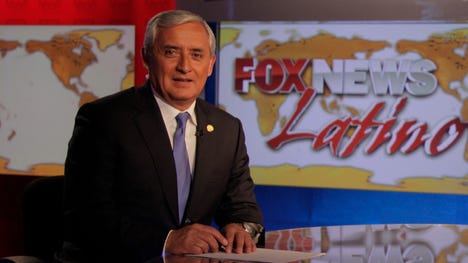
New York – While touting himself as one of the most popular leaders in Latin America, the newly elected President of Guatemala, Otto Perez Molina, defended the legalization of drugs as part of his new "iron fist" approach toward fighting drug violence during a one-on-one interview with Fox News Latino.
"It?s the first time that a president in power dares to say that other routes have to be found for the war on drugs," Perez Molina said in Spanish. "And that?s part of what we always said: the iron fist is character, it?s firmness, it?s determination and it?s the political will to want to do things."
Perez Molina and other Latin American leaders harped on the war on drugs and the need for a candid conversation about new ideas for the war on drugs in their speeches to the United Nations General Assembly.
"Something about what we are doing is not working," said Perez Molina of the last 20 years, "I find that drug trafficking has increased; that crime has increased; that violence has increased."
Perez Molina said he is looking for drug regulation; a middle ground between full "liberalization," where drugs are sold on every corner store and the current prohibitionist stance. He suggested regulations be put in place based on how addictive or how dangerous drugs are.
"In the case of marijuana, there are scientific studies that state that it creates less addictiveness and it?s less dangerous than alcohol and tobacco," he said. "There are, then, tiers that can be established, that can be regulated, and I believe there?s space there for dialogue with a foundation."
The president who at one point served as the nation's intelligence chief and was a general during the country's civil war also denied accusations of human rights abuses. Perez Molina has been accused of involvement in scorched earth campaigns during the early 1980s in the country's Ixil Traingle - a region of Quich� that saw 2744 people killed between January 1982 and late December 1983.
"Any accusation that has been leveled against me is not credible because it?s not true," he said. "So not only are there no accusations, much less trials for human rights violations, on the contrary: [my administration has] the recognition of Guatemalans for having been a negotiator and a person who signed the Accord for a Firm and Lasting Peace."
He also brushed off accusations that people are wary of his presidency, because of of his past.
"I found out about a survey that Mitofsky conducts... results place me as one of the three most popular presidents in their own country out of all Latin American presidents," Perez Molina said. "So this is recognition that Guatemalans approve of the good work that we?re doing."
While much of the media attention has concentrated on President Felipe Calder�n's aggressive war against drug cartels, much less has been said of the affects the war has had on its Central American neighbors - especially Guatemala.
According to UN statistics, Guatemala's murder rate was 38.5 per 100,000 inhabitants in 2011, more than seven times higher than in the U.S. and more deadly than Mexico, but significantly lower than neighboring Honduras, which logged one of the highest murder rates in the world at 91.6 per 100,000. Criminal groups exploit the porous border Mexico and Guatemala share, which counts only 11 formal ports of entry along its 600 miles.
A UN official estimated in 2011 that traffickers controlled up to 60 percent of Guatemalan territory. An estimated 14,000 people, mostly young men, belong to gangs in Guatemala.
Since the end of Guatemala's civil war ended in 1996, the US has spent $85 million fighting drug traffickers in Guatemala. Last year spending was $16 million and is budgeted to decline to 9 million in 2013. Meanwhile the U.S. dramatically stepped up counter narcotics funding to Mexico under a five-year program called the Merida initiative that will send a total of $2 billion to Mexico from 2008 to 2013.
The president credits his administration and iron fist approach for 13 percent less murders, 25 percent less kidnappings and for bringing down murders of women by 20 percent.
Perez Molina acknowledged, however, that the relationship between the US and Guatemala could improve.
"If I had to grade what we?ve been working on with the United States, well, I would give it, on a scale of 1 to 10 I could say a 6; we could be working together and we could reach a 10 level," he said.
Perez Molina even offered his own specific proposal in improving the relationship with the U.S. against the international drug trade.
?Look, for each kilo of drugs seized in Guatemala or in any Central American country, I think that the United States should provide some financial assistance so we can continue carrying out this war because currently, resources that we could be dedicating to education, to health, to hunger or poverty in our country we have to channel to this effort."
Read more: http://latino.foxnews.com/latino/politics/2012/09/27/guatemalan-president-argues-drug-legalization-and-calls-out-us-anti-drug-effort/#ixzz27huJftWN
Posted By: Josue Morejon
drug use should not be legalized even if its in another country. It can only cause more problems and other types of violence can erupt.
ReplyDeletezach J
It's defiantly a good thing that more leaders are taking a stand against these drug cartels and other drug-related crimes. Rouge drug lords have held way too much power for too long.
ReplyDelete